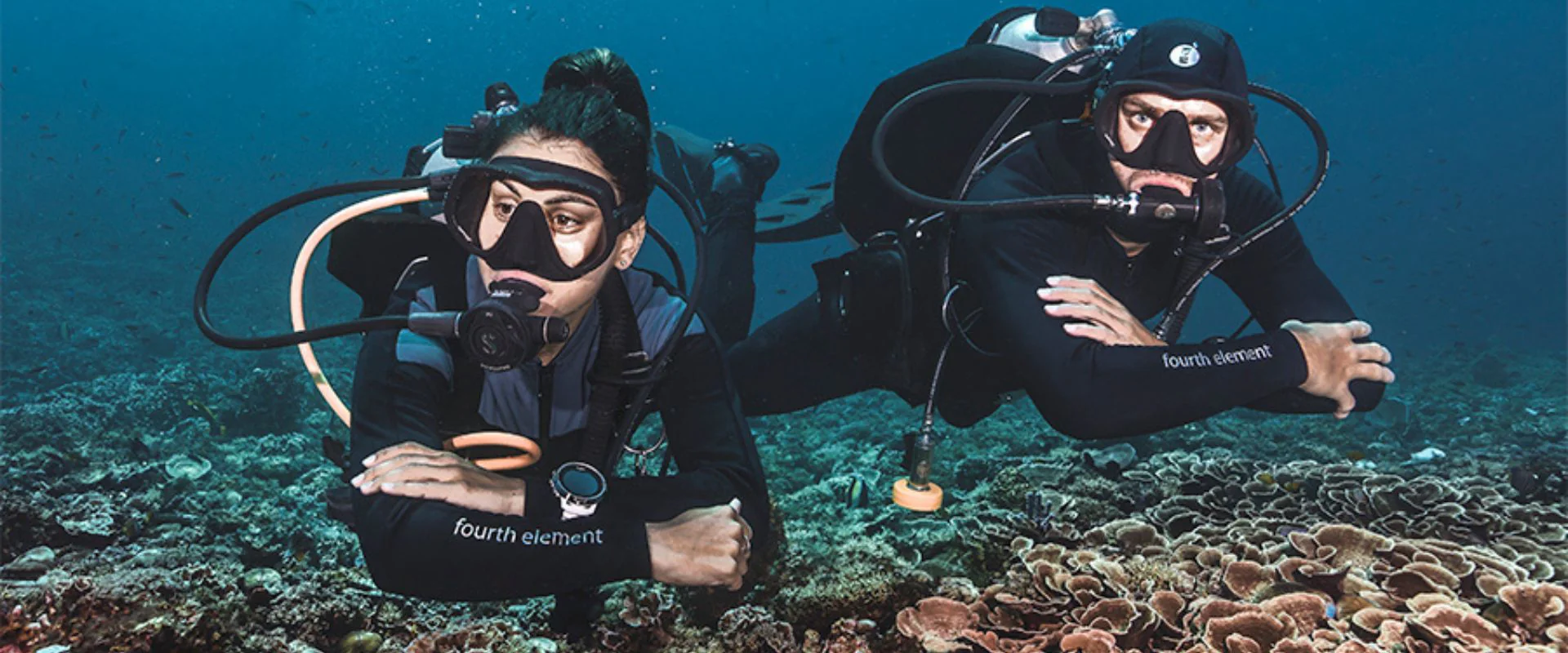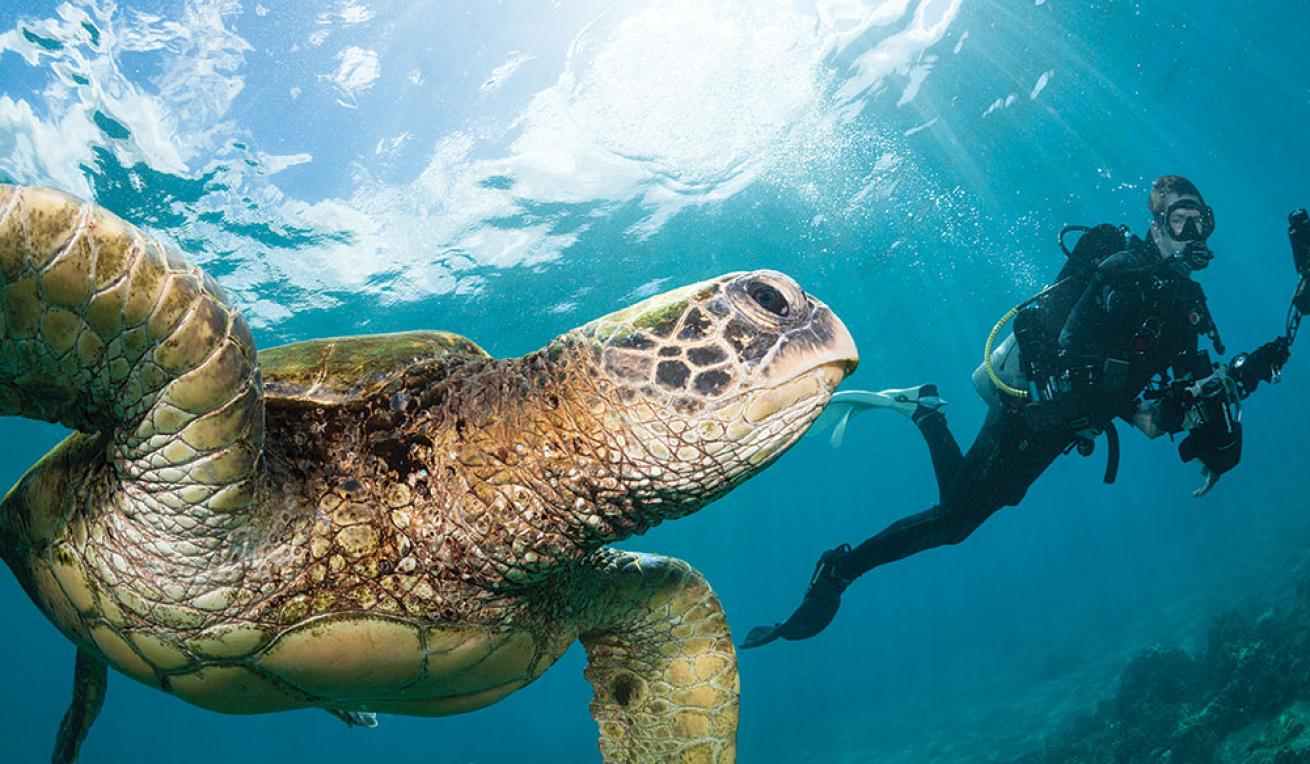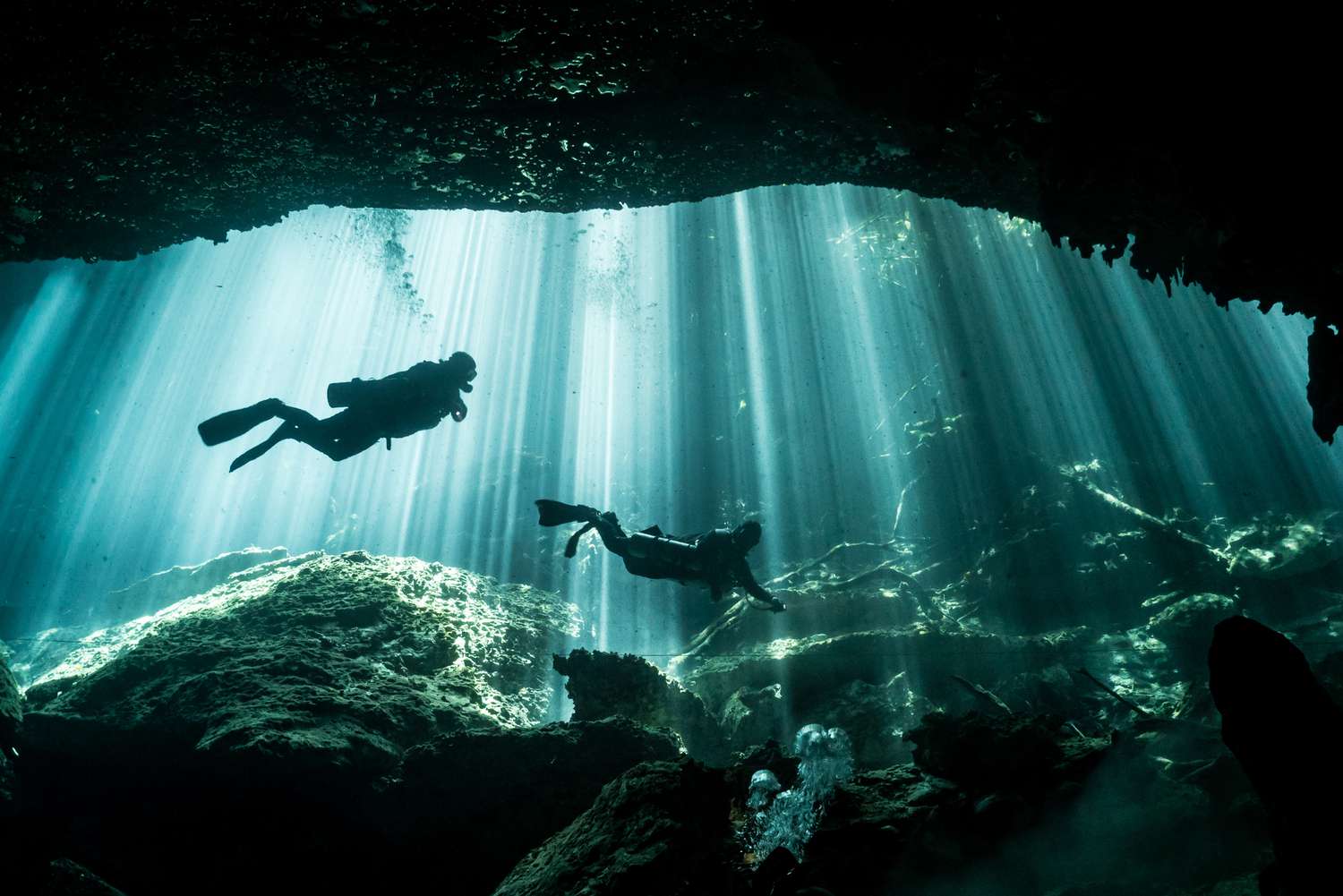Table of Contents
As a diver, you have the unique opportunity to explore the underwater world and be part of its diverse ecosystem. Delving into the deep blue, you become a steward of the marine environment, and your choices in diving equipment can have a significant impact on the fragile underwater realm you admire. This diving experience, especially when approached with an eco-friendly and sustainable mindset, can be a transformative journey, inspiring not just senior women but all divers to embrace the ocean with confidence and responsibility. In response to the growing need for environmental conservation, many dive gear manufacturers are prioritising sustainability, offering eco-friendly options to help you dive responsibly.

To ensure that you’re choosing the right equipment, it’s essential to evaluate the eco-friendly diving gear available and consider the broader implications of your decisions. Factors such as the impact of packaging and transportation, as well as supporting marine life and oceanic ecosystems, will play a crucial role in your ability to dive responsibly. By opting for sustainable products, you’ll not only protect the environment but also set an example for fellow divers.
Evaluating Eco-Friendly Diving Gear
Eco-conscious divers, you know that the choices you make in selecting your diving gear, especially when opting for alternatives made from natural materials, can have a significant impact on the environment. These natural materials are not only eco-friendly and sustainable but often plant-based and organic, aligning with the environmentally conscious ethos of selecting diving gear alternatives to neoprene. In this section, we’ll discuss several important factors to consider when choosing eco-friendly diving gear.
Material Matters: From Neoprene to Natural Rubber
Traditional diving suits are primarily made from neoprene, a synthetic rubber material. However, eco-friendly alternatives have emerged using natural rubber, which is both biodegradable and sustainably sourced. These suits often have similar performance capabilities to their synthetic counterparts while still being environmentally responsible. When you’re shopping for diving gear, consider looking for products made from natural rubber or other proven safe, recycled materials.
The Truth About Plastic Waste in Diving Equipment
Diving equipment often contains plastic components, which can contribute to plastic waste in our oceans. Being aware of single-use plastics and microplastics in your diving gear is essential for eco-friendly divers. You can help reduce plastic waste by:
- Opting for reusable and recyclable products in your diving gear
- Properly disposing of any waste materials produced during your dives
- Supporting companies that strive for sustainable practices and the reduction of plastic waste. Additionally, innovative practices such as repurposing fishing nets into recycled materials for diving gear exemplify how the industry can address ocean waste by transforming pollution into valuable products.
How Sustainable Manufacturing Makes a Difference
The way diving gear is manufactured also has a significant impact on the environment. When searching for eco-friendly equipment, consider the following aspects of a company’s manufacturing process:
- Sourcing of materials: Look for companies that use sustainable, recycled or recyclable materials in their products
- Manufacturing practices: Prioritise companies that minimise the use of harmful chemicals, have a lower carbon footprint, and utilise energy-efficient processes
- Packaging: Seek out brands that use minimal, biodegradable, or recyclable packaging, as this can help reduce waste
By evaluating diving gear based on the materials it’s made from, the potential impact of plastic waste, and a company’s commitment to sustainable manufacturing practices, you’ll be doing your part to ensure that your diving experiences are as eco-friendly as possible.
Choosing the Right Eco-Friendly Dive Gear
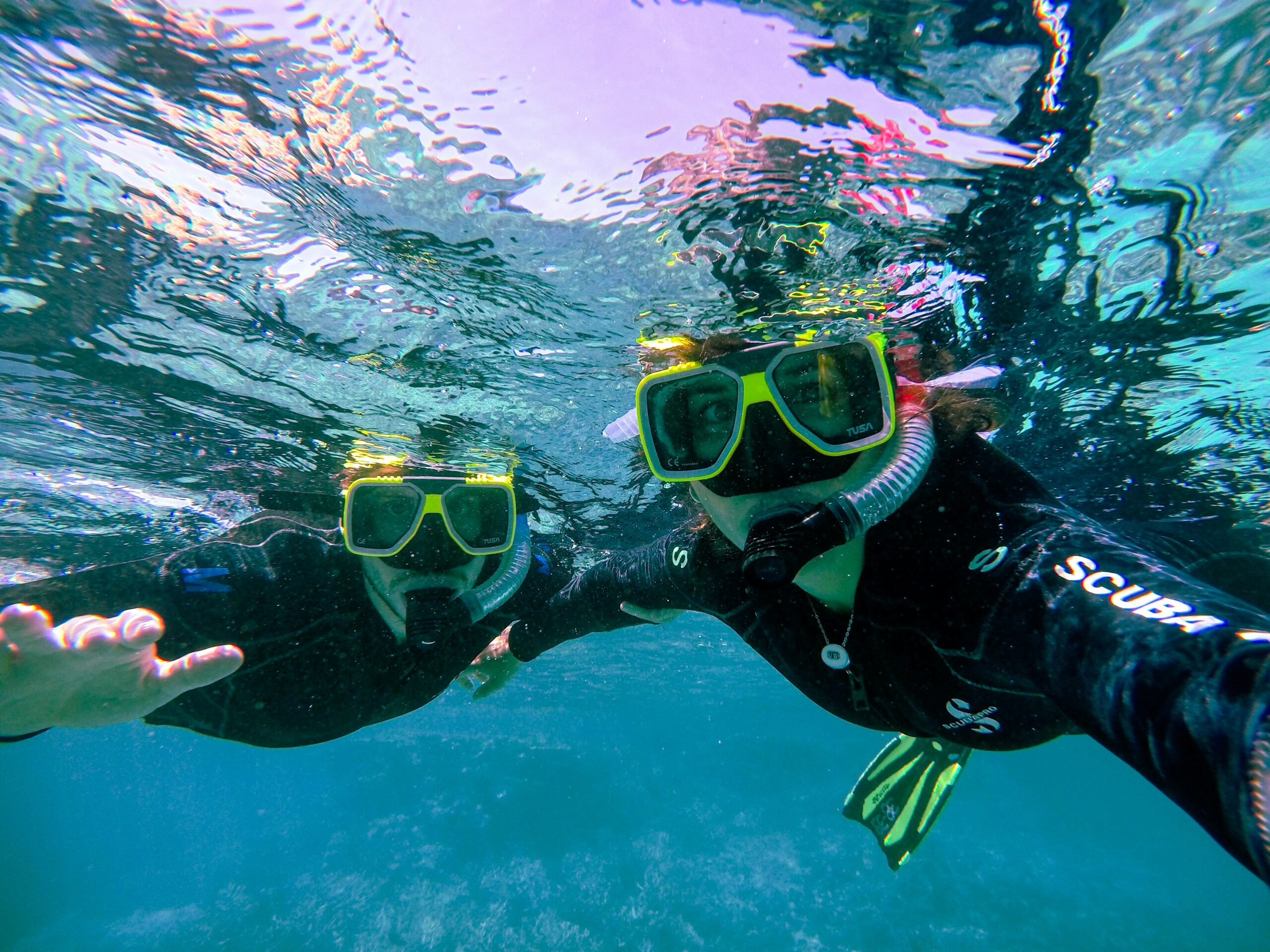
Gearing Up with Green Alternatives
When it comes to eco-friendly diving gear, there are a variety of sustainable options available that can help you minimise your environmental impact. Consider purchasing gear made from recycled materials to reduce waste, or support brands that utilise biodegradable packaging.
Here are a few suggestions for eco-friendly gear:
- Wetsuits: Look for wetsuits made from environmentally-friendly materials, such as limestone neoprene or natural rubber. These wetsuits have a reduced environmental impact compared to traditional petroleum-based ones.
- Fins: Opt for fins made with materials such as recycled plastic or those that use eco-friendly manufacturing processes.
- Masks and Snorkels: Choose masks and snorkels with high-quality silicone and durable frames, contributing to a longer product lifespan and reducing waste.
Remember to properly maintain and clean your gear, which will improve its durability and decrease the need for frequent replacements.
Brands Committed to the Ocean’s Well-being
Many companies have recognised the importance of safeguarding our oceans and have developed sustainable diving gear in response. By supporting these brands, you can feel confident in your eco-friendly choices and contribute to the long-term health of our oceans.
Some noteworthy companies committed to sustainability include:
- Company A: A pioneer in eco-friendly diving gear, Company A uses recycled materials in their wetsuits and other products. They actively invest in environmental initiatives and strive to reduce their manufacturing footprint.
- Company B: Known for their high-quality, durable dive gear, Company B has introduced eco-friendly options that use sustainable materials, such as limestone neoprene, and implement low-energy production methods.
- Company C: A smaller brand, Company C has gained recognition for their mission to create sustainable, environmentally-friendly diving gear. They use recycled materials, avoid harmful chemicals, and promote ocean conservation.
When selecting your eco-friendly dive gear, consider the environmental impact of the products and the commitments companies have made to protecting our oceans. By choosing wisely and supporting responsible brands, you can dive responsibly and help preserve our oceans for future generations. Scuba divers play a crucial role in marine conservation by selecting gear from brands that prioritize sustainability, thereby directly contributing to the health of our oceans.
The Impact of Packaging and Transportation
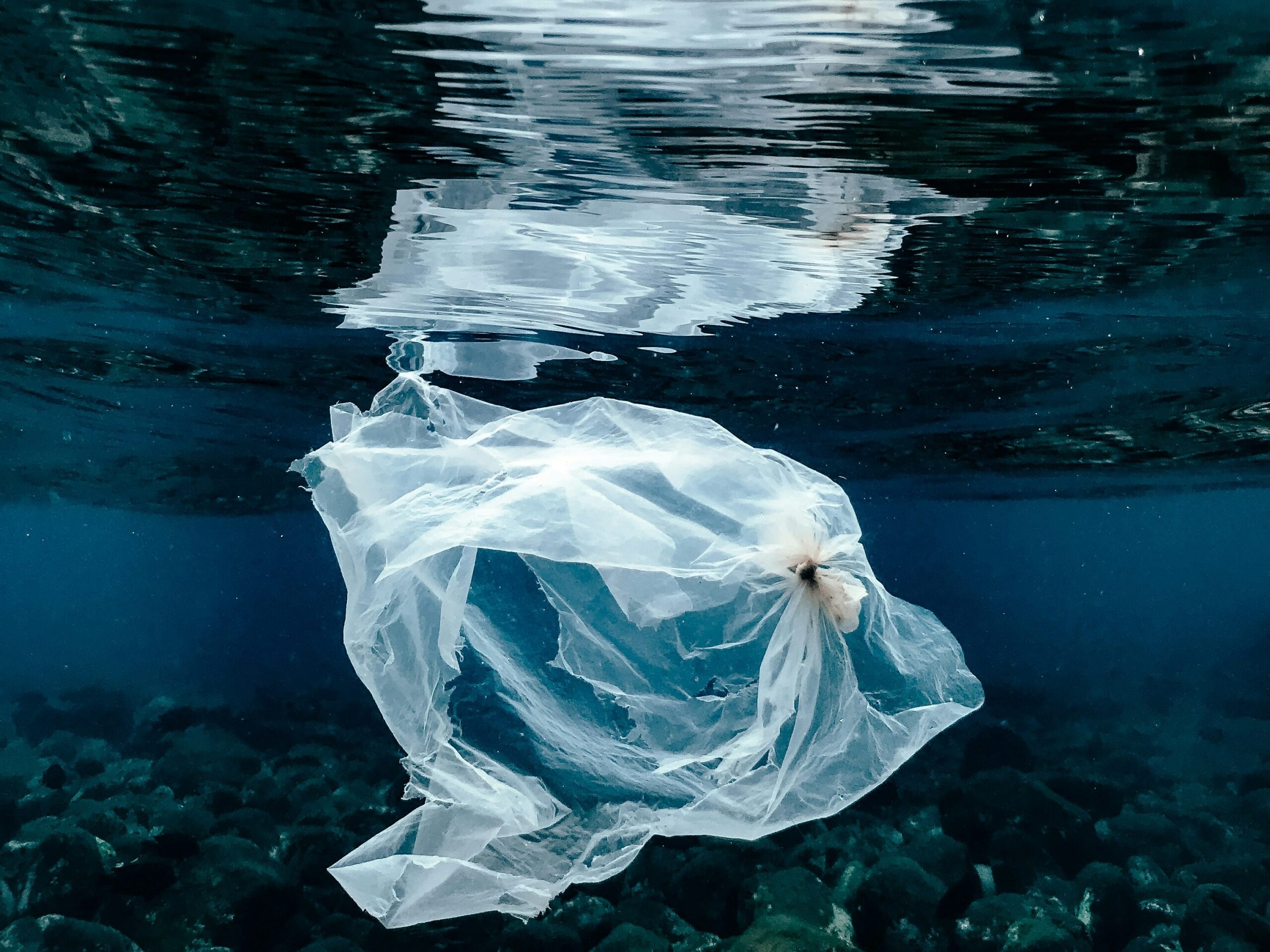
Reducing Plastic Bottles and Packaging in Diving Products
As a diver, you should be aware of the environmental impact of your gear, particularly its packaging. Many diving products come packaged in single-use [plastic bottles] and plastic packaging, which can harm the environment when improperly disposed of. By choosing products with more eco-friendly packaging, you can help reduce waste and contribute to a cleaner ocean.
Many manufacturers now offer diving products made from recycled materials, such as wetsuits, fins, and other accessories. This not only reduces the amount of new plastic required to produce these items but also helps to keep used plastic out of the environment. Look for products that are clearly labelled as made from recycled materials and companies that are committed to reducing their environmental impact.
When possible, choose products that come in sustainable and minimal packaging. Look for products packed in recycled cardboard, paper, or biodegradable materials instead of plastic. Avoid items wrapped in excessive plastic film, as this contributes to unnecessary waste.
The Journey from Manufacturer to Diver
The transportation of diving equipment from the manufacturer to your doorstep also has an environmental impact. Long journeys that rely on multiple modes of transport, such as lorries, ships, and aeroplanes, can contribute significantly to greenhouse gas emissions.
To help reduce your gear’s impact on the environment:
- Buy locally: Support local diving shops and businesses that source products closer to home. This will reduce the distance your gear needs to travel and help lower emissions.
- Choose eco-friendly shipping options: If buying online, look for retailers that offer eco-friendly shipping methods, such as carbon-neutral or reduced-emissions delivery services.
- Consolidate orders: If you need multiple items, try to order them all at once. This can help reduce the number of individual shipments, as well as packaging, conserving both resources and energy.
By considering the implications of both packaging and transportation for your diving gear, you can make more informed choices and actively contribute to protecting the environment you love to explore.
Supporting Marine Life and Oceanic Ecosystems
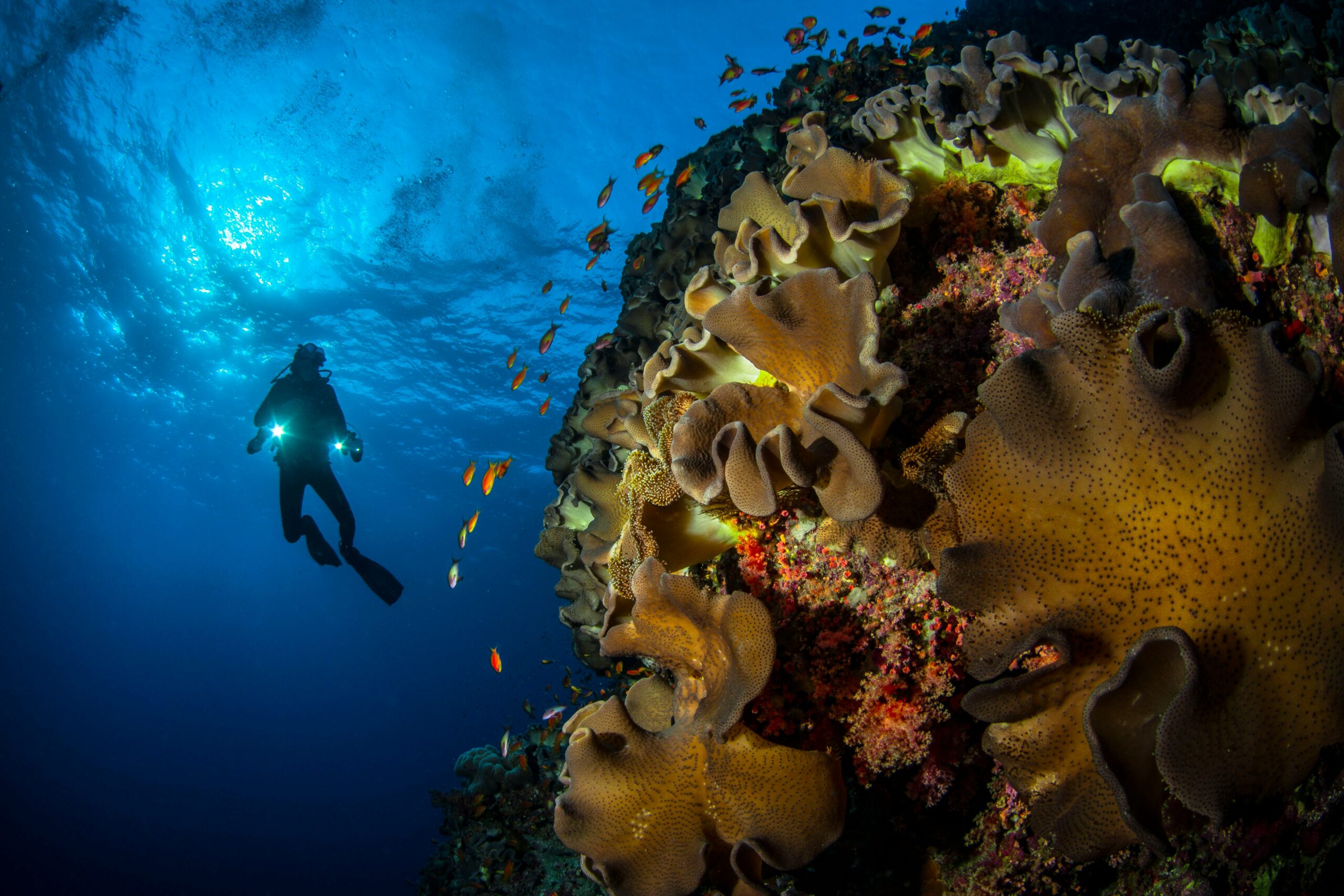
As a scuba diver, it’s essential for you to be aware of and minimise your impact on marine life and the oceanic ecosystem. There are several dive practices and gear choices that can help you contribute to environmental conservation, protect coral and saltwater fish, and ensure the underwater world remains healthy and thriving.
Dive Practices that Protect Coral and Saltwater Fish
When you embark on a dive trip, there are several practices you can follow to minimise your impact on the ocean’s floor and its inhabitants:
- Maintain neutral buoyancy – By perfecting your buoyancy skills, you’ll be able to avoid accidentally touching or damaging corals and sea life.
- Polite finning technique – Be conscious of your finning technique and avoid stirring up sand and silt, which can smother coral larvae and harm saltwater fish.
- No touch policy – Avoid touching or handling marine life, as it can cause injuries and stress.
- Be aware of your equipment – Make sure your diving equipment is secured and not dragging on the ocean floor.
- Choose eco-friendly operators – Dive with environmentally responsible operators, such as those who use sustainable underwater adventures.
By adopting these practices, you actively contribute to the protection of the underwater world and its delicate ecosystems.
Contributions to Environmental Conservation Through Diving
Taking part in environmentally responsible diving isn’t just about limiting your personal impact. You can also actively contribute to marine conservation efforts:
- Participate in coral restoration programmes: Dive operators, like coral restoration projects, allow divers to help repair damaged reef systems.
- Report signs of damage or stress: Keep an eye out for signs of injured marine life or coral bleaching, and report them to local authorities or conservation groups.
- Cleanup dives: Join or organise dive trips focused on removing debris such as plastics and fishing gear from the oceans. This helps to protect marine life and maintain their habitat.
Finally, invest in eco-friendly dive gear, such as wetsuits made from sustainable materials or biodegradable dive equipment. By supporting the production of sustainable products, you aid in the overall effort to protect our planet’s oceans and maintain the health of their delicate ecosystems.
Frequently Asked Questions
Sustainable scuba diving equipment focuses on eco-friendly materials and ethical manufacturing processes. Look for items made from materials like recycled plastics, natural rubber, and sustainably sourced neoprene. Products should also have minimal packaging and preferably be designed to have a long lifespan. Certifications such as Bluesign can help you identify eco-friendly gear.
To minimise your environmental impact while diving, follow responsible diving practices. Use eco-friendly equipment, avoid touching marine life, maintain proper buoyancy control, and wear reef-safe sunscreen. Additionally, support dive operators focused on sustainability and participate in local conservation initiatives.
Some brands known for producing eco-friendly diving gear include Fourth Element, Aqua Lung, Waterlust, and Stream2Sea. Pay attention to their manufacturing processes, use of sustainable materials, and commitment to reducing their environmental footprint.
Alternatives to single-use plastics in diving include reusable water bottles, mesh bags, cloth surface marker buoys, and biodegradable dive bin liners. Use eco-friendly alternatives whenever possible and be mindful of proper waste disposal while on dive trips.
Responsible diving supports marine conservation by minimising the negative effects of diving on marine ecosystems. By following eco-friendly practices and supporting sustainable dive operators, you promote ocean health, contribute to local communities’ economies, and help preserve underwater environments for future generations.
When selecting eco-friendly diving gifts, consider the gift’s materials, manufacturing processes, packaging, and the environmental values of the manufacturers. Opt for items made from sustainable materials like recycled plastics or natural rubber. An ideal environmentally friendly diving gift should have minimal environmental impact and encourage responsible diving practices.

